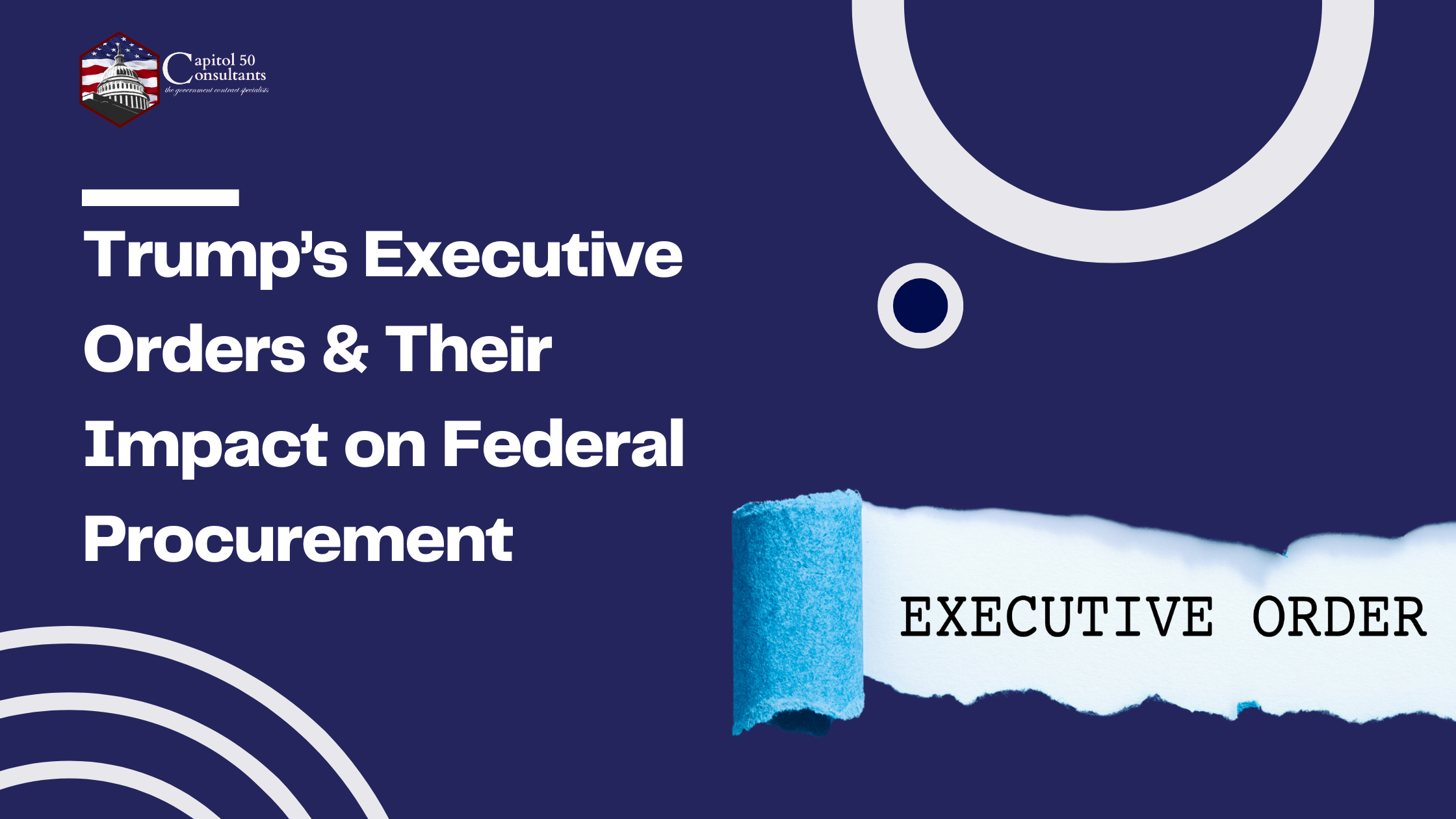President Donald Trump’s latest executive orders have triggered significant changes in federal procurement policies, impacting government contractors, suppliers, and businesses seeking to work with federal agencies. These orders, aimed at reshaping government spending priorities, include contract suspensions, the rollback of Diversity, Equity, and Inclusion (DEI) initiatives, federal funding freezes, and heightened compliance risks.
Understanding these shifts is crucial for businesses already engaged in federal procurement and those looking to enter the government contracting space. Below, we break down the key executive orders and their implications for contractors and federal suppliers.
1. The Suspension & Termination of Federal Contracts
The Trump administration has initiated a comprehensive review of government spending, resulting in the suspension and termination of several pending and awarded contracts. Federal agencies have been directed to:
- Delay awarding new contracts.
- Halt the exercise of options on existing agreements.
- Issue stop-work orders for specific projects.
Contractors now face uncertainty in procurement timelines, delayed debriefings, and increased risks of contract non-fulfillment. To mitigate potential losses, businesses should closely monitor procurement agency decisions, document all contract-related communications, and be prepared to file claims for recoverable costs in the event of work suspensions.
2. The Elimination of DEI Initiatives in Federal Procurement
One of the most controversial executive orders, EO 14151, has effectively dismantled DEI-focused policies within the federal government. The order:
- Eliminates all DEI offices and mandates within federal agencies.
- Discontinues federal DEI-related grants and contracts.
- Ends Chief Diversity Officer roles in government agencies.
This change means that businesses previously benefiting from DEI-focused procurement advantages, such as minority-owned, women-owned, and veteran-owned enterprises, may no longer receive the same level of preference in federal contracting.
Companies should reassess their procurement strategies and compliance requirements to align with the administration’s shift toward merit-based contracting.
3. Federal Funding Freeze & Its Ramifications
Memo M-25-13 has paused several federal funding streams while the administration reevaluates government financial assistance. This freeze impacts:
- Federal grants and loan disbursements.
- Federally funded social programs.
- Contract payments tied to agencies undergoing policy shifts.
The uncertainty surrounding funding has already led to contract slowdowns and delays in federal invoice payments. Some federal agencies, including the Departments of Justice, Labor, and Transportation, have notified contractors that funding suspensions are under legal review, following a court-issued temporary restraining order against parts of the executive order.
Rescission of Memo M-25-13
On January 29, 2025, the Office of Management and Budget (OMB) officially rescinded Memo M-25-13. However, the White House press secretary emphasized that the rescission “is NOT a rescission of the federal funding freeze.” This means that while the memo itself is no longer in effect, the broader freeze on federal financial assistance remains in place, and businesses should still expect potential delays in funding and contract approvals.
Contractors who rely on federal grants or loan-backed contracts should remain vigilant, document any disruptions, and explore alternative funding options while awaiting further guidance from agencies.
4. The Affirmative Action Ban for Federal Contractors
In addition to eliminating DEI-focused policies, the Trump administration has revoked Executive Order 11246, which previously required affirmative action programs for federal contractors. The key takeaways from this change include:
- End of affirmative action obligations: Federal contractors are no longer required to implement affirmative action plans for women and minorities.
- OFCCP (Office of Federal Contract Compliance Programs) enforcement halt: Federal compliance audits and affirmative action-related hiring mandates have been suspended.
- New compliance certifications: Contractors must now certify that they do not engage in any DEI-related hiring practices deemed non-compliant with federal anti-discrimination laws.
While contractors may still maintain DEI programs, they must carefully ensure that these initiatives align with federal anti-discrimination laws to avoid potential legal challenges.
5. False Claims Act Risks for Contractors with DEI Policies
A significant legal risk emerging from Trump’s executive orders is the imposition of False Claims Act (FCA) liability on federal contractors with DEI programs. The new policies:
- Require contractors to certify compliance with federal anti-discrimination laws.
- Increase the risk of FCA lawsuits if DEI policies are deemed non-compliant.
- Incentivize whistleblower reports from employees or competitors.
Under the FCA, penalties for false claims can range from $13,946 to $27,894 per violation, which can amount to millions in liability for large federal contractors. Companies must conduct internal audits of their hiring and compliance policies to minimize exposure to legal and financial risks.
6. How Businesses Can Enter Federal Procurement
Despite regulatory changes, businesses still have opportunities to enter the federal marketplace. Here are essential steps for businesses looking to secure government contracts:
- Register with SAM.gov – Obtain a Unique Entity Identifier (UEI) and complete registration to be eligible for federal contracts.
- Identify Relevant NAICS Codes – Align services with the correct North American Industry Classification System (NAICS) codes.
- Research Available Contracts – Explore open contract opportunities via beta.SAM.gov.
- Ensure Compliance with New Regulations – Stay updated on shifting policies and evolving contract requirements.
- Consider Partnering with a GSA Consultant – Work with experts in General Services Administration (GSA) schedules to streamline the contracting process.
7. Are You Qualified to Sell to the Government?
Navigating federal procurement under new regulations can be complex. Ensuring compliance and meeting eligibility requirements is crucial for businesses seeking to secure government contracts.
Capitol 50 offers tailored guidance to help businesses determine their federal procurement eligibility and streamline the application process.

